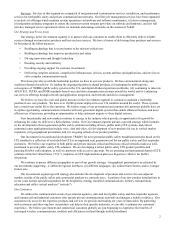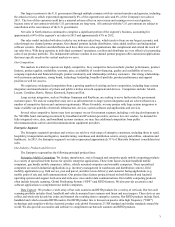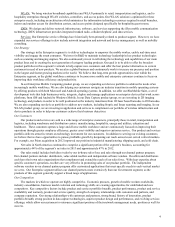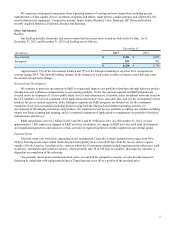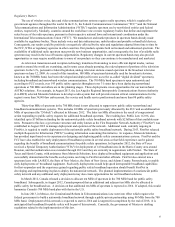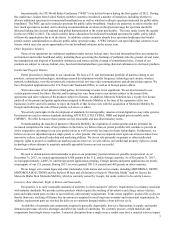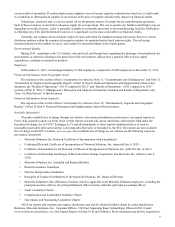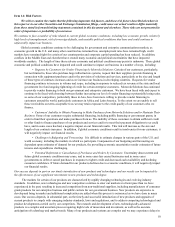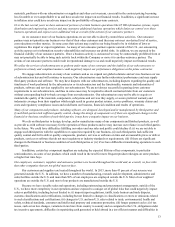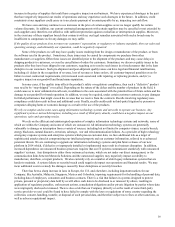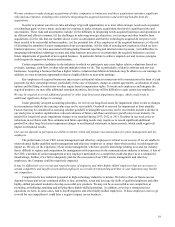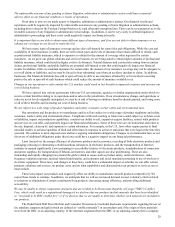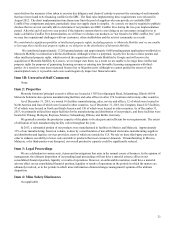Motorola 2013 Annual Report Download - page 14
Download and view the complete annual report
Please find page 14 of the 2013 Motorola annual report below. You can navigate through the pages in the report by either clicking on the pages listed below, or by using the keyword search tool below to find specific information within the annual report.12
Generally, U.S. government contracts and grants are subject to oversight audits by U.S. government representatives.
Such audits could result in adjustments to our contracts or grants. Any costs found to be improperly allocated to a specific
contract or grant may not be allowed, and such costs already reimbursed may have to be refunded. Future audits and
adjustments, if required, may materially reduce our revenues or profits upon completion and final negotiation of audits.
Negative audit findings could also result in investigations, termination of a contract or grant, forfeiture of profits or
reimbursements, suspension of payments, fines and suspension or prohibition from doing business with the U.S. government.
All contracts with the U.S. government are subject to cancellation at the convenience of the U.S. government.
In addition, contacts with government officials and participation in political activities are areas that are tightly controlled
by federal, state and local laws. Failure to comply with these laws could cost us opportunities to seek certain government sales
opportunities or even result in fines, prosecution, or debarment.
Government regulation of radio frequencies may limit the growth of public safety broadband systems or reduce barriers to
entry for new competitors.
Radio frequencies are required to provide wireless services. The allocation of frequencies is regulated in the U.S. and
other countries and limited spectrum space is allocated to wireless services and specifically to public safety users. The growth
of public safety broadband communications systems may be affected: (i) by regulations relating to the access to allocated
spectrum for public safety users, (ii) if adequate frequencies are not allocated, or (iii) if new technologies are not developed to
better utilize the frequencies currently allocated for such use. Industry growth may also be affected by new licensing fees
required to use frequencies.
The U.S. leads the world in allocating spectrum to enable wireless communications such as wireless local area network
systems, such as WiFi, mesh technologies and wide area network systems, such as WiMAX and LTE. Other countries have also
allocated spectrum to allow deployment of these and other technologies. This changing landscape may introduce new
competition and new opportunities for us.
The Middle Class Tax Relief and Job Creation Act of 2012 (the “Legislation”) authorized an additional ten MHz of
broadband spectrum for public safety use for a total of 20 MHz of contiguous broadband spectrum for public safety. In
addition, public safety retained 14 MHz of the 700 MHz narrowband spectrum, subject to the FCC's authority to determine
whether such spectrum should be authorized for future broadband use. The Legislation further provides for the establishment
of a centralized governance model through an independent authority within NTIA designated as the “First Responder Network
Authority” or “FirstNet” but allows for states to opt out of the plan to develop a nationwide public safety network and perform
their own competitive procurements if certain criteria are met. States that opt out would still be eligible for funding and would
also be allowed to generate revenue through leases to secondary users.
Although the Legislation has been enacted, the implementation of a nationwide public safety network under FirstNet has
been delayed and could be reduced significantly in scope due to: (i) complexities in the acquisition of a nationwide network,
which involves regulatory requirements, (ii) writing of the specifications and statement of work, (iii) decision making on the
system architecture or (iv) potential political opposition from certain states. Any such delays or changes in scope of the
FirstNet initiative could negatively impact our ability to further develop and expand our public safety LTE business in the U.S.
For example, FirstNet may define specifications for the nationwide network which make it impossible or impractical for
commercial LTE infrastructure and equipment vendors to compete for contracts to build out the network. Furthermore, states
may seek alternative means to deploy public safety LTE networks if a centralized architecture inhibits states' ability to
operationally control its first-responder agencies.
We derive a portion of our revenue from government customers who award business through competitive bidding which can
involve significant upfront costs and risks. This effort may not result in awards of business or we may fail to accurately estimate
the costs to fulfill contracts awarded to us, which could have adverse consequences on our future profitability.
Many government customers, including most U.S. government customers, award business through a competitive bidding
process, which results in greater competition and increased pricing pressure. The competitive bidding process involves
significant cost and managerial time to prepare bids for contracts that may not be awarded to us. Even if we are awarded
contracts, we may fail to accurately estimate the resources and costs required to fulfill a contract, or to solve problems with our
subcontractors or suppliers, which could negatively impact the profitability of any contract award to us. In addition, following a
contract award, we have experienced and may continue to experience significant expense or delay, contract modification or
contract rescission as a result of customer delay or our competitors protesting or challenging contracts awarded to us in
competitive bidding.
We enter into fixed-price contracts that could subject us to losses in the event we fail to properly estimate our costs.
We enter into a number of firm fixed-price contracts. If our initial cost estimates are incorrect, we can lose money on
these contracts. Because many of these contracts involve new technologies and applications, require us to engage
subcontractors and can last multiple years, unforeseen events, such as technological difficulties, fluctuations in the price of raw


